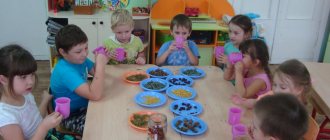Class hour in 4th grade “Friendship and relationships with peers”
Class hour in 4th grade
“Friendship and
relationships with peers”
Goal:
formation of friendly relations among children.
Progress of the lesson
1. Determining the topic of the class hour
The letters D, R, U, F, B, A are posted on the board
Children are asked to form a word from these letters.
— Guys, as alas, you already guessed, the topic of today’s class hour will be “Friendship”
-What do you know about friendship? How do you understand the meaning of this word?
-Who is a friend? What should a friend be like?
- You have friends?
- Do you consider yourself a good friend?
2. Discussion of the concept of “Friendship”
I would like to start the conversation about friendship “from the opposite direction.” The concept opposite to friendship is “selfishness”
If a person is selfish, he cannot have a true friend. Vladimir Ivanovich Dal, in his famous “Explanatory Dictionary,” gives the following definition of friendship: “Friendship is a disinterested, persistent affection.”
The famous scientist and writer puts selflessness first. You are friends with a person not so that he will do something good to you, not because it is beneficial. You are friends with a person because he is close to you. His interests, his views, his inner world are close. There are, of course, people who choose a friend “for beautiful eyes.” If a person knows how to dress beautifully, I will be friends with him. If he doesn’t know how, I won’t. Such people will never have real friends. And without friends a person cannot be happy.
It happens that for the sake of friendship you need to sacrifice your personal interests. And if friendship is truly valuable to you, you do it without thinking.
Speaking about friendship, one cannot fail to mention such an important concept as decency.
Decency underlies many human actions. Standing up for a younger person, giving up your seat on the bus, coming to the aid of an older person - all these are manifestations of decency. Only a decent person can have real, loyal, reliable friends. Friends for life.
- Today we will figure out what friendship is. What does it mean to be a friend
3.Analysis of the text by V. Oseev “Blue Leaves”
Katya had two green pencils. And Lena has none. So Lena asks Katya:
– Give me a green pencil.
And Katya says:
– I'll ask my mom.
The next day both girls come to school. Lena asks:
– Did your mom allow it?
And Katya sighed and said:
– Mom allowed it, but I didn’t ask my brother.
– Well, ask your brother again,” says Lena.
Katya arrives the next day.
– Well, did your brother allow it? – Lena asks.
– My brother allowed me, but I'm afraid you'll break your pencil.
– “I’m careful,” says Lena. “Look,” says Katya, “don’t fix it, don’t press hard, don’t put it in your mouth.” Don't draw too much.
How to teach children to be friends with their peers
Category: Articles
Tags: education, Children, psychology, parents
Advice from psychologists
Children need to be taught to make friends - yes, yes, such seemingly natural relationships do not appear out of nowhere. The ability for friendship is not absorbed with mother’s milk; children need to be explained the rules of interaction in a team and their significance. To teach a child to be friends with other children, as practice shows, you need to make a lot of effort. Children's friendship is a real success, because a child who has a friend is more protected, his level of psychological comfort is much higher than that of a loner.
What is friendship?
This is interaction with the people around you. If previously a child had enough communication with his mother and other family members, then from the age of three he gradually begins to be interested in his peers. How to interact with them? In many ways, the success or failure of a relationship depends on what communication skills the child has mastered when interacting with his parents. Relationships with peers are a turbulent life on the border of one’s own self. How to teach a child friendship, to make sure that he is not an outcast in the children's group? The problem of children's friendship in psychology: movement inward and outward
Friendship is an important aspect in a child’s life, because it is on the border of one’s own “I” that the most interesting things happen: the child invites something or someone and lets them in, and tries to protect himself from something or someone. And this is important for both psychological and physical health. If we talk about the physical level, our body needs the intake of air, food, water and the removal of carbon dioxide, sweat, urine, etc. At the psychological level, such movement in and out is carried out by our needs.
The needs associated with movement outward are the so-called aggressive needs. These include both the need to protect one’s own territory and actions related to expanding one’s own boundaries and capabilities (enrolling in a university, declaring one’s love, etc.). The fulfillment of these needs is important and useful, but only in an acceptable form.
For example, if your husband makes you angry, you don't hit him in the face with a shovel like a little girl in the sandbox, but you express your feelings with your voice, gestures, and I-messages.
Another example: if you are in love, then you do not attack a person with kisses, but present your feelings differently, for example, like Tatyana Onegin. A person’s inability to express his needs associated with movement beyond his own inner world leads to the accumulation of internal energy, which can manifest itself in uncontrollable outbursts of anger and rage. It’s good if anger and rage, as they say, serve simply to “let off steam.” It’s worse if the accumulated internal energy finds a way out not in anger and rage, but in chronic illnesses or in a feeling of dissatisfaction with oneself and one’s life.
The needs associated with movement inward are designed to provide our body and our personality with something new, pleasant, and useful. If we talk about love in the context of this type of need, then in order to love and be loved, you need to be able not only to defend yourself, attack, conquer and master, but also to accept, let in, listen. That is, to be able to accept gifts, including the gift of love.
In a healthy psychological process, the needs associated with movement inward and the needs associated with movement outward continuously replace one another.
As for the psychology of children's friendship, in this case the child must be able to make acquaintances, accept love, recognition and stand up for himself in a team. So friendship between children is a phenomenon of constant compromises.
Each person himself regulates the mode of opening and closing his borders, gradually learning to let in what is useful and reject what is harmful to his inner world. The development of this mechanism is inextricably linked with the awareness of one’s feelings, needs and ways of constructively presenting them to the world.
It would be a mistake to think that the problem of children's friendship will resolve itself as soon as the baby begins to go out into the yard, at the age of three or four years. Of course, the child begins to communicate with peers with already developed skills of fusion, pressure or cooperation. Nurturing Friendship
Among the most common problems in children's groups are fights, that is, the inability to talk constructively about one's anger; isolation - fear of presenting yourself, your feelings and desires; the desire to dominate - the realization of the need for love through intimidation; as well as the manifestation of hysterical methods of interaction, clinginess, long-term grievances, the desire to impose one’s desires on others.
The psychology of children's friendship is not selfish; everything has its source. The stormy rivers of children's problems carry within them the waters of parental attitudes, feelings, fears, restrictions and difficulties. But before moving on to the advice of psychologists that can help children in their difficulties, you need to plunge into parental difficulties.
To make a child’s life on the playground and in the company of peers happy, to help the child make friends, as practice shows, two things are enough: - adhere to the rules of showing emotions and presenting needs; - and be sure to be just as attentive to your desires and feelings.
The ability of parents to correctly present and fulfill their needs helps the child develop the skill of cooperation with both adults and peers. Paying attention not only to the child’s needs, but also to your own, as well as finding constructive ways to meet them, will help you discover and delineate the boundary between you and your son or daughter, especially as the baby grows, becomes an adult and learns to listen to the world around him. In the process of nurturing friendship, remember that for children you are the very first, most natural and accessible trainer in terms of communication and interaction with the world. Only you can teach your child to defend himself when needed and to ask for help and attention when needed.
Of course, parents have to sacrifice a lot of their needs with the birth of a child. Sometimes, for example, even the time when mom or dad takes a shower is determined by the baby. Parenthood, in addition to tenderness, joy, pride, tenderness and love, imposes on us the need for enormous daily work. That is why parents become parents not at five or twelve years old, but at that age when a person is able to temporarily sacrifice his needs for the sake of another small creature. The key word here is “for a while.” For both children and parents, the laws of fulfilling needs work the same way. The fulfillment of needs can be postponed for a while, the frequency and form of their satisfaction can be changed, but it is impossible to completely get rid of the desire to improve, learn new things, or simply relax! True children's friendship in a team
For long-term friendly relationships in a team, it is important to be able to show not only friendliness and goodwill, but also to be able to defend one’s interests without destroying friendly relations.
Being friendly and kind is a wonderful attitude or attitude to start a relationship, but unfortunately, this is not enough for a long friendship. It is impossible to enjoy each other endlessly. It is impossible to have the same desires, the same aspirations, the same opinions about all events, phenomena and objects and, thanks to this, remain in an idyllic state of fusion. A difference in views will certainly give rise to a dispute, a difference in needs will lead to the need to identify and defend them. On the one hand, this is a simple truth, on the other hand, it is an insurmountable barrier for many relationships, and not only children’s ones.
The most difficult stage in the development of any unions (love, friendship, child-parent) is the realization that your partner, although similar to you in many ways, is a different being from you, and much in his vision does not coincide with your point of view. Accepting this difference makes relationships deeper and more interesting - one where there is room not only for friendly head nodding, but also for contradictions and arguments. At this stage, two different worlds come into contact, understanding and accepting their differences. As practice shows, it is impossible to teach a child to be friends without understanding and recognizing the differences between people, without respect for other people’s needs. Without this, only an unhealthy merger can become the basis of the relationship. And this, in turn, inevitably leads to resentment - we were deceived! - or feeling guilty because we did not live up to the expectations of another.
How to teach a child to be friends with peers, to always be a welcome member of the children's team? Help in getting through this difficult stage in a relationship will be the ability to respect the feelings and desires of the other, as well as the skills to establish and defend your priorities. Moreover, it will not work to defend, having only compliments and friendly smiles in your arsenal. So you need to give your child additional behavior patterns that will help maintain both friendship and his own individuality. Strong friendship at school
If you noticed, children do not like those who boss them around all the time, but they also do not respect those who cannot stand up for themselves. A new fairy tale will help your child learn to communicate his needs to others and listen to other people's desires. As you probably already understood, the main training ground will again be your relationship with him.
Strong friendship between children at school is impossible without the ability to express one’s desire and respect the desires of another - this is the main skill of productive communication. This is exactly what you can successfully practice in your relationship with your child. Pay attention: how often do you neglect your child’s wishes or your own? What motivates you to act this way?
If we take natural tendencies in the formation of communication skills with peers, then interest in other children arises in children aged four to five years. When playing, kids of this age mainly reproduce the actions and actions of people well known to them: moms and dads. From the age of five, children's play becomes more complex.
On the one hand, children want to remain “like everyone else,” to have similar toys and notebooks. On the other hand, children who can offer something extraordinary are popular. It is important to help your child find a balance between the desire to be like others and the desire to be special. Such duality of aspirations is inherent in man in general and clearly manifests itself during each of the age-related crises, which can also be observed in our first-graders who are overcoming the crisis of six or seven years.
To teach your child to be friends with classmates as closely as possible, help your child come up with interesting, original ideas. Treat your child's desire to be like others with respect and understanding. This can be a real help in making friends and helping to comfortably join the school community. The child develops his main arsenal of communication skills with peers when communicating with his parents. By not skimping on messages of love towards the child, parents help the first-grader to be friendly, and by demonstrating by example the ability to stand up for oneself and listen to the desires of others, they will give the right direction on the path to building long and respectful relationships. It is important to help your child find a balance between the desire to be like others and the desire to be special.
Source: vkapuste.ru









